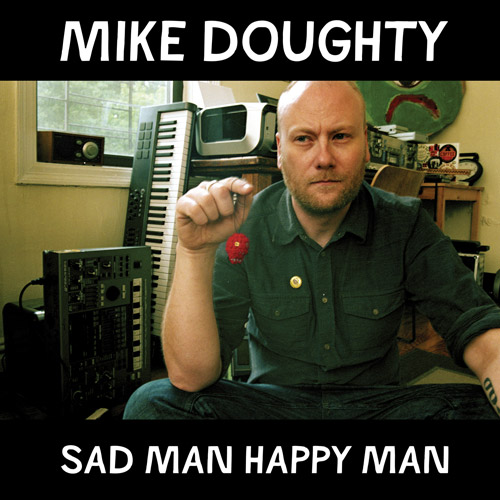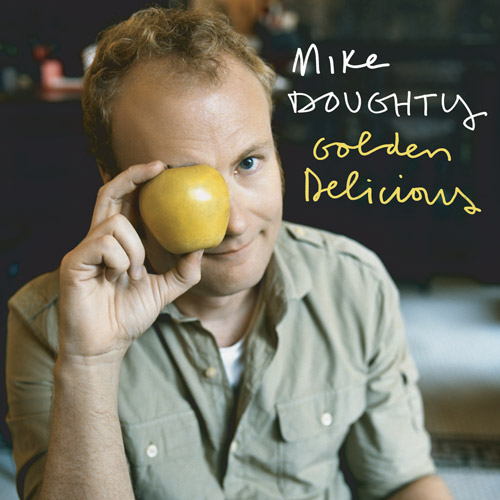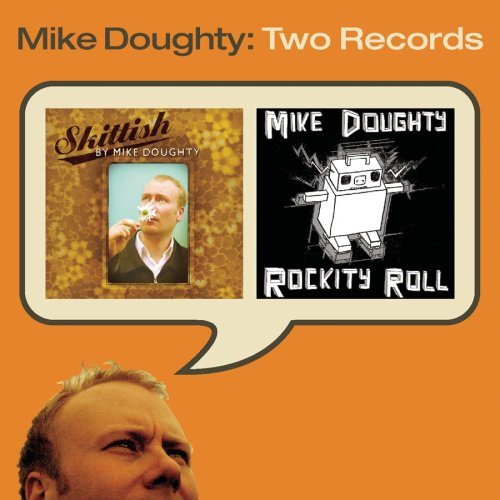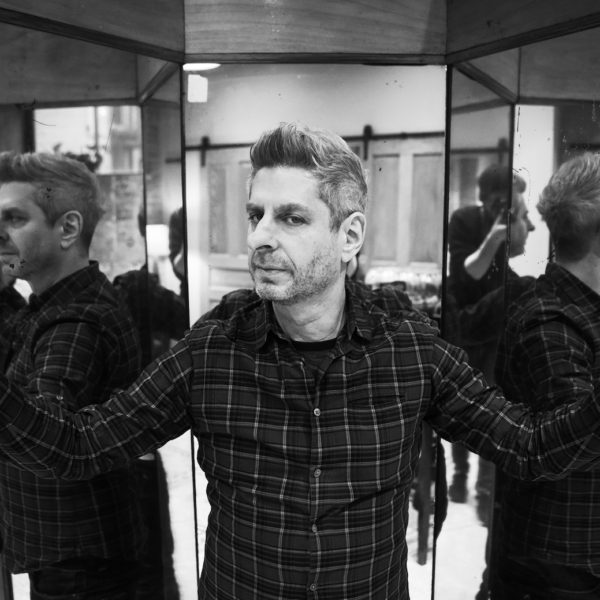
Mike Doughty
Mike Doughty’s new album, Golden Delicious, is a loose-limbed, freewheeling set that brings all the aspects of his singular muse together in one smart, humorous and eloquent package. Doughty’s last offering, 2005’s Haughty Melodic, was a sprawling, expansive set that took years to produce. On Golden Delicious, Doughty hewed close to his “dude theory” — the idea of making a relaxed record that sounds like a bunch of dudes playing music for the pure joy of playing. It was cut with his touring band: keyboardist John Kirby, drummer Pete McNeal, and bass player Andrew “Scrap” Livingston, who moved over to guitar for the recording process. Semisonic’s John Munson sat in on bass and recent GRAMMY winner Dan Wilson (Semisonic, Jewel, Dixie Chicks) returned as producer.
“With Haughty, [Dan and I] started with drum machine, piano and guitar,” Doughty recalls. “We kept bringing people in to lay down drums, pedal steel or whatever, layer on layer. This time the intention was to make everything live, spontaneous and of the moment. I’ve been playing with these guys for a couple of years and encouraged them to contribute to the process. They put their individual stamp on the music and had input into the arranging and development of the songs. I like guys who can surprise me and I was always smiling in the studio.” Doughty credits the album’s spacious, panoramic sound to Wilson’s knack for keeping things simple and his ability to make even the quietest songs sound “loud.”
Like Haughty Melodic, and his work with Soul Coughing, Golden Delicious is melodically rich and rhythmically dense, with Doughty’s vocals giving the lyrics a syncopated pulse that adds another level of complexity to the overall sound. Most of the songs were cut live. Minimal overdubs from guitarist David Levita, percussionist Ken Chastain and backing vocalist Mankwe Ndosi were added later. One track, “I Got The Drop On You,” is the studio demo, played live into one microphone.
Golden Delicious shows off the band’s focused playing and Doughty’s penchant for intricate wordplay. “27 Jennifers,” the first single, is based on a solid rock riff and features John Kirby’s sparkling keyboard work. “When I went to high school everyone was named Jennifer, Michelle or Heather,” Doughty explains. “This is a salute to them. I love the breakdown that leads to John’s psychotic Van Halen-esque keyboard solo.” Pete McNeal’s slightly skewed stop-and-start pulse on “I Just Want The Girl In The Blue Dress To Keep On Dancing” lends an interesting twist to what could have been a straightforward R&B tune. A chattering guitar, Kirby’s spacey synthesizer and Doughty’s wordless vocal accents give the track a bright, mischievous vibe. “Sometimes you’ll see a cute sexy girl dancing at a show,” Doughty says. “You’ll feel an extrasensory sexual connection, but when the show is over, she’s always gone.” The mood is darker on “I Got the Drop on You,” a stark guitar and vocal performance about a painful breakup that could be about a relationship or a dysfunctional family. “As a kid you don’t understand why your parents are behaving the way they behave,” Doughty says. “After years of therapy, I can see what they were going through. I framed it as a love song to make it more universal.”
The album’s most political song is “Fort Hood.” It borrows its chorus from “The Flesh Failures (Let The Sunshine In),” a song from the seminal ’60s musical Hair. The drama of the song’s Gospel-influenced arrangement is intensified by Kirby’s sanctified keyboard work and Doughty’s snarling vocal. “Fort Hood is the Texas Army base that has lost the most troops in the Iraq War,” Doughty says. “I visited some of the wounded troops at Walter Reed Hospital in D.C. and wondered what was going through their minds. When I first thought about using ‘Let the sunshine in…’ as the chorus, I thought it would be funny, but when I sang it, I felt myself tearing up. [‘Let the Sunshine In’] draws an obvious parallel to past quagmires, and all the vets who are suffering from PTSD. Once again the damage being done will not only be in lives lost, but in how those losses affect family, friends and society as a whole. The bridge laments the fact that instead of going to the prom, they’ve been given a burden they’re going to have to live with forever.”
Mike Doughty’s father was in the U.S. Army and Doughty was schooled on Army bases in the United States and Europe. “The army in the ’70s was a fucked up place,” Doughty recalls. “I had an ordinary public high school experience, but the army seeped into everything, very regimented, strict and masculine. I was a fish out of water in the extreme; I was too sensitive, too questioning. When I found music, it changed everything. I didn’t know anything about music or how to play it, but put up posters of Iggy and the Stones and the shit hit the fan. Rock was not beloved by the culture that was spat on and called baby killers.”
Doughty played bass in a high school band and started writing songs as soon as he picked up the bass. “When I could play two notes, I’d yell something over it and call it a song.” By the time he entered the New School in New York City to study poetry, he’d developed his syncopated guitar style. “I listened to Public Enemy and tried to play their rhythms on guitar; with a combination of ineptitude and persistence, I started playing the rhythms within the melodies.”
Doughty credits Sekou Sundiata’s poetry class and the work of playwright Suzan-Lori Parks with sparking his interest in the craft of songwriting. “Sundiata told me to let the poem, or the song, do what it wanted to do,” Doughty explains. “He spoke about how to be musical, how words exist within time and transcend time. I’m rhythmically driven; it’s my blessing and my curse. The rhythms of my guitar, the nature of my voice and the strange cadence of the lyrics aren’t funky enough to be funk, but they’re too funky to be rock.” This dilemma is at the heart of Doughty’s art — an inability to compromise his desire for honest communication for the sake of the marketplace. “I’m an adult, trying to be an adult. It’s not the most commercial move to make at 37, but you have to let the music take you where it wants to go.”
Doughty’s solo career started with Skittish, a solo acoustic album Doughty made in 1996. His band, Soul Coughing, was signed to Warnes Bros. Records at the time; the label rejected Skittish, but it leaked and became a hit on Napster. After the band split in 2000, Doughty rented a car and started playing acoustic shows. “People who knew the songs from the Internet lip-synched every word,” Doughty recalls. In four years, Doughty sold 20,000 copies of Skittish at gigs and through his website, with virtually no promotion. He was actually making a living playing music. “Even when I was in Soul Coughing with hits on alternative radio and a video on MTV, I was writing CD reviews under a pseudonym to make ends meet.”
Being on the road sent Doughty’s creativity into overdrive. He released a live album called Smofe + Smang in 2002 and the Rockity Roll EP in 2003. He was working on the songs that became Haughty Melodic when he ran into Dave Matthews, a big Soul Coughing fan, at Bonnaroo. Matthews signed Doughty to his ATO label and released Haughty Melodic. ATO also issued a two-CD set comprising Skittish and Rockity Roll, along with several bonus tracks.
Haughty Melodic followed in 2005, Doughty’s first solo album with a band backing him, and reached the top 5 at AAA radio on the strength of the hit single “Looking at the World from the Bottom of a Well.” Doughty and his band — simply billed as Mike Doughty’s Band — performed at Bonnaroo and the Austin City Limits Festival, supported arena tours with Dave Matthews Band and Barenaked Ladies, and headlined successful nationwide club tours. And through it all, Doughty has maintained a widely read blog (mikedoughty.com/blog) chronicling his unique shows, creative endeavors, international travels and more.





